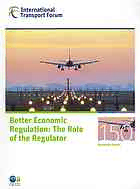
Better economic regulation : the role of the regulator : roundtable report. PDF
Preview Better economic regulation : the role of the regulator : roundtable report.
Better Economic Regulation: B e The Role of the Regulator t t e r E Efficient provision of transport infrastructure is critical to economic c o growth. The long asset lives of much transport infrastructure n o m indicates governance through regulation, rather than through i c contract or public ownership. This can ensure predictability in R long-term relationships whilst preserving some flexibility to deal e g with changes in external circumstances. u l a t The transparency created by a fully independent regulator is io n invaluable for ensuring that sufficient investment is forthcoming, : T while maintaining reasonable conditions for user access. h e Discussion at the Roundtable focussed on how to achieve effective R o independent regulation and how to reconcile independence with l e the legitimate control of policy by the executive part of government. o f t Independent regulation is not seen as a universal default governance h e arrangement. Much of the discussion focused on when to regulate R e and when to rely on competition, even if imperfect, to drive g u efficiency. The discussions underscored that there are opportunities l a t to improve performance significantly in the aviation, rail and o r road sectors, by learning from successful experience in improving Better Economic governance structures in a range of countries. 150 Regulation: The Role of the Regulator R Roundtable Report o u www.oecd.org/publishing n d t a b l e R e International Transport Forum -:HSTCSC=VUW^ZY: p o r 2 rue André Pascal t • 75775 Paris Cedex 16 1 5 0 [email protected] (74 2011 02 1 P1) www.internationaltransportforum.org ISBN 978-92-821-0295-4 2011 Better Economic 150 Regulation: The Role of the Regulator Roundtable Report This work is published on the responsibility of the Secretary-General of the OECD. The opinions expressed and arguments employed herein do not necessarily reflect the official views of the Organisation or of the governments of its member countries. Please cite this publication as: OECD (2011), Better Economic Regulation: The Role of the Regulator, ITF Round Tables, No. 150, OECD Publishing. http://dx.doi.org/10.1787/9789282103272-en ISBN 978-92-821-0295-4 (print)(cid:3) ISBN 978-92-821-0327-2 (PDF)(cid:3) Series: ITF Round Tables(cid:3) ISSN 2074-3378 (print)(cid:3) ISSN 2074-336X (online) Photo credits: Cover © Stefan Lenz / Panther Media / GraphicObsession. Corrigenda to OECD publications may be found on line at: www.oecd.org/publishing/corrigenda. © OECD/ITF 2011 You can copy, download or print OECD content for your own use, and you can include excerpts from OECD publications, databases and multimedia products in your own documents, presentations, blogs, websites and teaching materials, provided that suitable acknowledgment of OECD as source and copyright owner is given. All requests for public or commercial use and translation rights should be submitted to [email protected]. Requests for permission to photocopy portions of this material for public or commercial use shall be addressed directly to the Copyright Clearance Center (CCC) at [email protected] or the Centre français d’exploitation du droit de copie (CFC) [email protected]. INTERNATIONAL TRANSPORT FORUM The International Transport Forum at the OECD is an intergovernmental organisation with 52 member countries. It acts as a strategic think tank with the objective of helping shape the transport policy agenda on a global level and ensuring that it contributes to economic growth, environmental protection, social inclusion and the preservation of human life and well-being. The International Transport Forum organizes an annual summit of Ministers along with leading representatives from industry, civil society and academia. The International Transport Forum was created under a Declaration issued by the Council of Ministers of the ECMT (European Conference of Ministers of Transport) at its Ministerial Session in May 2006 under the legal authority of the Protocol of the ECMT, signed in Brussels on 17 October 1953, and legal instruments of the OECD. The Members of the Forum are: Albania, Armenia, Australia, Austria, Azerbaijan, Belarus, Belgium, Bosnia-Herzegovina, Bulgaria, Canada, Croatia, the Czech Republic, Denmark, Estonia, Finland, France, FYROM, Georgia, Germany, Greece, Hungary, Iceland, India, Ireland, Italy, Japan, Korea, Latvia, Liechtenstein, Lithuania, Luxembourg, Malta, Mexico, Moldova, Montenegro, Netherlands, New Zealand, Norway, Poland, Portugal, Romania, Russia, Serbia, Slovakia, Slovenia, Spain, Sweden, Switzerland, Turkey, Ukraine, the United Kingdom and the United States. The International Transport Forum’s Research Centre gathers statistics and conducts co-operative research programmes addressing all modes of transport. Its findings are widely disseminated and support policymaking in Member countries as well as contributing to the annual summit. Further information about the International Transport Forum is available at www.internationaltransportforum.org 5 TABLE OF CONTENTS – TABLE OF CONTENTS SUMMARY OF DISCUSSIONS .......................................................................................................... 7 EFFECTIVE REGULATORY INSTITUTIONS FOR AIR TRANSPORT: A EUROPEAN PERSPECTIVE – by Hans-Martin NIEMEIER (Germany) ............................... 35 1. Introduction ............................................................................................................................ 39 2. Effective Regulatory Institutions for Air Transport ............................................................... 41 3. The Value Chain for Air Transport and Regulatory Intervention .......................................... 43 4. Summary: Reform of Regulatory Institutions ........................................................................ 61 EFFECTIVE REGULATORY INSTITUTIONS: THE REGULATOR’S ROLE IN THE POLICY PROCESS, INCLUDING ISSUES OF REGULATORY INDEPENDENCE – by Tom WINSOR (United Kingdom) ................................................................................................ 71 1. Introduction ............................................................................................................................ 75 2. Purpose of Regulation ............................................................................................................ 76 3. The Role of Politicians ........................................................................................................... 77 4. Regulatory Policy ................................................................................................................... 80 5. Effective Regulation ............................................................................................................... 85 6. Independence.......................................................................................................................... 86 TRANSPORT REGULATION FROM THEORY TO PRACTICE: GENERAL OBSERVATIONS AND A CASE STUDY – by Marco PONTI (Italy) ...................................... 93 1. Introduction ............................................................................................................................ 97 2. Some General Economic Issues Relevant for Institutional Choices ...................................... 98 3. Some Institutional Aspects ................................................................................................... 100 4. Specific Issues for Transport Regarding Institutional Aspects ............................................ 102 5. A Case Study: Transport Regulation in Italy ....................................................................... 105 6. Conclusions and Recommendations..................................................................................... 109 LIST OF PARTICIPANTS ............................................................................................................... 113 BETTER ECONOMIC REGULATION: THE ROLE OF THE REGULATOR – (cid:164) OECD/ITF 2011 7 SUMMARY OF DISCUSSIONS – SUMMARY OF DISCUSSIONS BETTER ECONOMIC REGULATION: THE ROLE OF THE REGULATOR – (cid:164) OECD/ITF 2011
